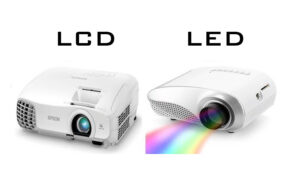What are LCD projector? Step into Clarity
LCD projectors, short for Liquid Crystal Display projectors, are advanced multimedia devices used to display images and videos on a larger screen or projection surface. These projectors utilize liquid crystal technology to project light through panels and produce vibrant visuals. LCD projectors are widely used in various settings such as classrooms, business presentations, and home theaters. Let’s delve deeper into how these projectors work and explore their advantages.
How LCD projectors work
LCD technology explained
LCD projectors employ a combination of liquid crystal panels, optical lenses, and a light source to project images. The light passes through three separate LCD panels, each representing the primary colors: red, green, and blue. These panels control the amount of light passing through them, creating a composite image that is then projected onto a screen or surface.
Light source and projection
LCD projectors typically use powerful lamps or LED lights as their light source. The light is directed toward the LCD panels, which selectively allow or block the passage of light based on the input signal. The resulting image is then magnified by the projector’s lenses and projected onto a screen, wall, or other suitable surfaces.
Advantages of LCD projectors
High image quality
LCD projectors offer exceptional image quality with sharp details and vibrant colors. The use of three separate LCD panels for primary colors allows for accurate color reproduction and enhanced image clarity.
Color accuracy and brightness
LCD projectors excel in color accuracy, making them ideal for applications that require precise color representation, such as graphic design or scientific visualization. Additionally, LCD projectors often deliver high brightness levels, ensuring visibility even in well-lit environments.
Energy efficiency
LCD projectors are known for their energy efficiency. Compared to traditional projection technologies, such as CRT (Cathode Ray Tube), LCD projectors consume less power while producing brighter images. This makes them a cost-effective choice for long-duration presentations or multimedia playback.

Common applications of LCD projectors
Business presentations
LCD projectors are extensively used in boardrooms, conference halls, and meeting rooms for professional presentations. The ability to project clear visuals and diagrams helps in effectively conveying information to a larger audience.
Classroom and educational use
LCD projectors have transformed the way lessons are taught. With the help of these projectors, teachers can display educational content, multimedia presentations, and interactive materials to engage students and facilitate effective learning.
Home theater systems
LCD projectors have gained popularity in home entertainment setups. They offer a cinema-like experience with larger-than-life visuals. Home theater enthusiasts appreciate the immersive environment and high-quality image reproduction provided by LCD projectors.
Factors to consider when buying an LCD projector
Resolution and image size
Consider the desired resolution and image size based on your requirements. Higher resolutions result in sharper images, while larger image sizes require projectors with higher brightness levels.
Connectivity options
Check the available connectivity options, such as HDMI, VGA, and wireless connectivity, to ensure compatibility with your devices. This enables seamless connectivity with laptops, smartphones, and other media sources.
Portability and installation: Evaluate the projector’s portability and ease of installation, especially if you plan to use it in multiple locations. Look for compact and lightweight models that offer flexibility in positioning and quick setup.
Related Articles:
FAQs About LCD Projectors
How does an LCD projector work?
LCD projectors work by passing light through liquid crystal panels that act as light modulators. These panels control the amount of light that passes through each pixel to create images on the screen.
What are the advantages of LCD projectors?
LCD projectors typically offer vibrant color reproduction, high image clarity, and good brightness levels. They are also often more affordable than other projector types.
Are there any downsides to LCD projectors?
While LCD projectors offer good image quality, they might suffer from the “screen door effect,” where individual pixels are visible up close. Additionally, they might have limited contrast compared to other projector technologies.
What are the typical applications of LCD projectors?
LCD projectors are commonly used for presentations in classrooms, business meetings, and conferences. They are also popular for home theaters due to their color accuracy and image clarity.
How do LCD projectors compare to DLP projectors?
LCD projectors use liquid crystal panels for image projection, while DLP (Digital Light Processing) projectors use micro mirrors. LCD projectors generally offer better color accuracy, while DLP projectors often have higher contrast ratios.
Can I connect my devices to an LCD projector?
Yes, most LCD projectors have multiple input ports (HDMI, VGA, etc.) that allow you to connect various devices like laptops, computers, Blu-ray players, and gaming consoles.
What is the lifespan of an LCD projector lamp?
The lifespan of an LCD projector lamp varies, but it typically ranges from 2,000 to 5,000 hours, depending on usage and settings. Some projectors offer eco-modes to extend lamp life.
Do LCD projectors require maintenance?
Yes, LCD projectors require occasional maintenance, such as cleaning the air filters and replacing the lamp when it’s worn out. Proper maintenance ensures optimal performance.
Are LCD projectors suitable for large venues?
Yes, LCD projectors can be used in large venues, but for very large screens or venues with high ambient light, more powerful projector types like laser projectors might be more suitable.
Conclusion:
LCD projectors are versatile multimedia devices that provide high image quality, color accuracy, and energy efficiency. They find applications in various fields, including business presentations, education, and home entertainment. When purchasing an LCD projector, consider factors such as resolution, connectivity options, and portability to ensure it meets your specific needs. With their impressive features and wide range of applications, LCD projectors continue to enhance visual experiences in both professional and personal settings.





